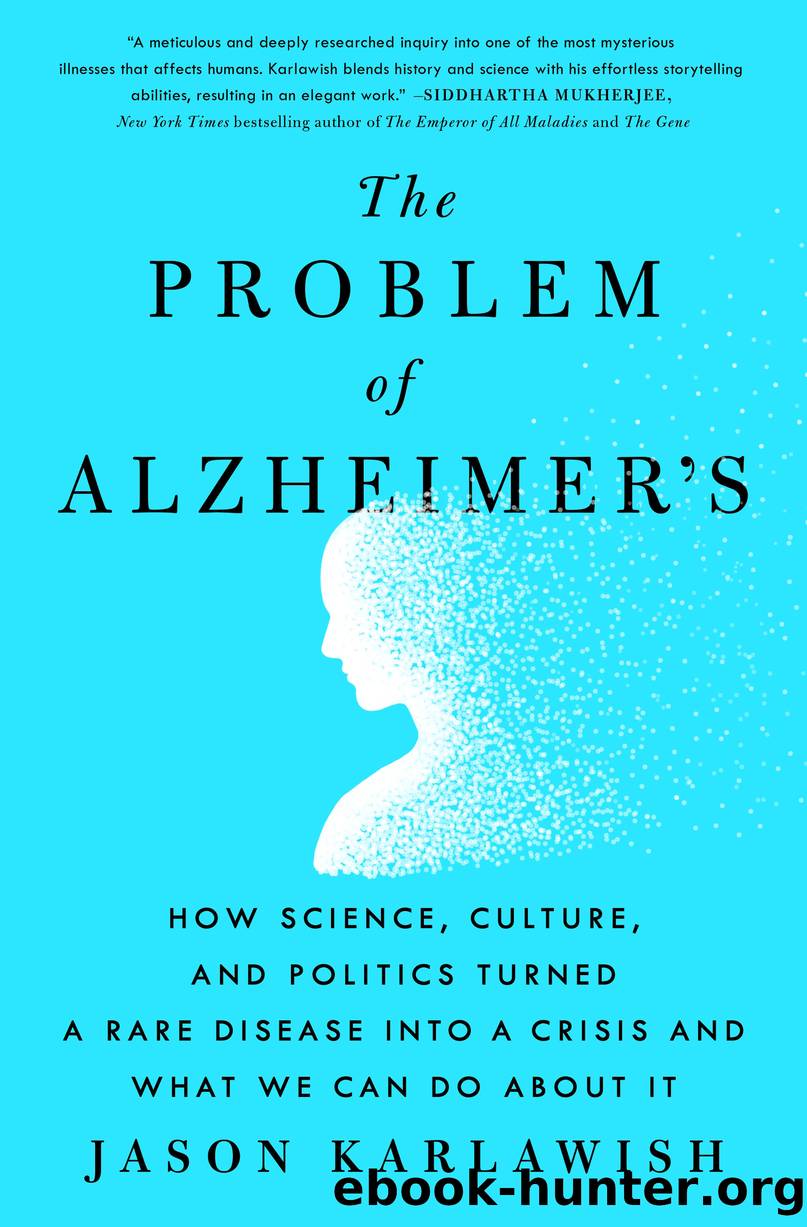The Problem of Alzheimer's by Jason Karlawish

Author:Jason Karlawish
Language: eng
Format: epub
Publisher: St. Martin's Publishing Group
* * *
The class, the brochures and web pages, the visits, emails, and telephone conversations with the Memory Center collectively gave Beverly and Darren Johnson knowledge and skills, and for about three years, our prescriptions of ways of living maintained their day-to-day well-being. But in time things began to fall apart. He could no longer read the newspaper. Television programs and his wood shop were confusing. He stuck to Beverly like a pet. She found this maddening. And then he became frightening. At the end of the day, he left her side to pace up and down the stairs and close the drapes. Home wasnât working for Mr. Johnson.
She called me panicked. âHe needs something to calm him. A tranquilizer of some sort.â
I agreed. He did need a new treatment, and so I drew up a prescription: not for a tranquilizer but for adult day care.
Of all the treatments for dementia, this is the most misunderstood. The confusion starts with the name. In Pennsylvania, where I practice, the state refers to the service as âolder adult daily living centers.â The trade association that represents the providers of the treatment calls it adult day services. The recipients of the care are called clients, participants, or members.
The center I prescribed, Main Line Adult Day Center, describes itself as an âadult day care centerâ and the twenty-six people who attend it are âmembers.â That center is a two-story house set along a suburban street. The front lawn leads up to a porch and a side driveway to the back entrance. It is all quite homelike, but inside is a lobby with a chest-high counter that resembles a physicianâs waiting room and a room equipped with basic medical equipment. And yet the space is neither a medical nor a rehabilitation facility. The multiple names for the place, the people who attend it, and the hybridized architecture denote something distinct, a therapeutic activity program for adults with cognitive and behavioral impairments.
Families often react to my calling it a treatment as though Iâm kidding them, that Iâm playing with the idea of treatment. Iâm insistent, however. Iâm not joking. For many patients, a therapeutic activity program is a far more effective and safer treatment than the medications prescribed for agitation. It reduces agitation and stress not only in the people who attend it but also in the family members I persuade to try it.1
I insist that before they reject the idea, they at least visit a center. In these places, I explain, every activity has a purpose and the staff are mission driven to achieve that purpose. Theyâre typically trained in occupational or recreation therapy and how to communicate with persons with dementia, a skill that relies on listening to emotions more so than exact words. Theyâre not in it for the money.
The days are a scheduled succession of activities beginning with breakfast and then exercise, word games such as using the letters of a long word (âastrophysicsâ) to spell shorter ones (âchat,â âsit,â âspot,â etc.), singing, and trivia.
Download
This site does not store any files on its server. We only index and link to content provided by other sites. Please contact the content providers to delete copyright contents if any and email us, we'll remove relevant links or contents immediately.
| Administration & Medicine Economics | Allied Health Professions |
| Basic Sciences | Dentistry |
| History | Medical Informatics |
| Medicine | Nursing |
| Pharmacology | Psychology |
| Research | Veterinary Medicine |
Periodization Training for Sports by Tudor Bompa(8274)
Why We Sleep: Unlocking the Power of Sleep and Dreams by Matthew Walker(6726)
Paper Towns by Green John(5191)
The Immortal Life of Henrietta Lacks by Rebecca Skloot(4589)
The Sports Rules Book by Human Kinetics(4388)
Dynamic Alignment Through Imagery by Eric Franklin(4217)
ACSM's Complete Guide to Fitness & Health by ACSM(4060)
Kaplan MCAT Organic Chemistry Review: Created for MCAT 2015 (Kaplan Test Prep) by Kaplan(4014)
Introduction to Kinesiology by Shirl J. Hoffman(3776)
Livewired by David Eagleman(3775)
The Death of the Heart by Elizabeth Bowen(3622)
The River of Consciousness by Oliver Sacks(3606)
Alchemy and Alchemists by C. J. S. Thompson(3522)
Bad Pharma by Ben Goldacre(3428)
Descartes' Error by Antonio Damasio(3279)
The Emperor of All Maladies: A Biography of Cancer by Siddhartha Mukherjee(3163)
The Gene: An Intimate History by Siddhartha Mukherjee(3099)
The Fate of Rome: Climate, Disease, and the End of an Empire (The Princeton History of the Ancient World) by Kyle Harper(3067)
Kaplan MCAT Behavioral Sciences Review: Created for MCAT 2015 (Kaplan Test Prep) by Kaplan(2987)
